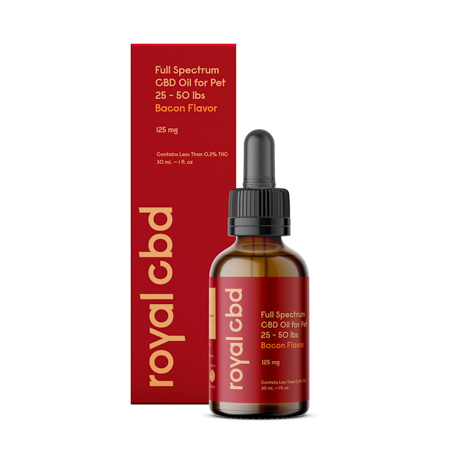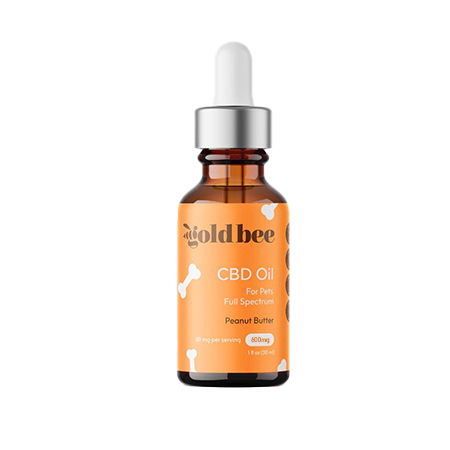Best CBD Oil for Dogs With Cancer

Dogs are more than just pets — they belong to the family. And as family members, they require respective care when it comes to keeping up with the veterinary routine and providing them with nutritious food to prevent diseases.
However, dogs can get sick even when they have the best care one could possibly imagine. And that, dear friends, can be devastating for the owner.
Over 75% of dogs are diagnosed with at least one disorder throughout their lives. According to the American Veterinary Medical Association (AVMA), almost half of dogs over the age of 10 will suffer from cancer.
In today’s article, we’ll talk about different types of cancer in dogs and how CBD oil might help them get through this difficult period with dignity. You’ll also see our product recommendations for the best CBD oils for dogs with cancer.
Best CBD Oil for Dogs with Cancer
1. Royal CBD (Overall Winner)
Get 15% off all Royal CBD products. Use code “CFAH” at checkout.
Product Details
| Pros | Cons |
|
|
Why Royal CBD Is the Best CBD Oil for Dogs with Cancer
After succeeding with its CBD oil selection for humans, Royal CBD has now introduced the same quality products for dogs. The available concentrations are measured based on the average weights of dogs, so they aren’t as strong as CBD oil for humans. Royal CBD remembers dogs of all sizes, from extra small to large canines.
You can choose from 125 mg, 250 mg, and 500 mg bottles, which translates to the following serving sizes:
- 4 mg CBD / mL
- 8.5 mg CBD / mL
- 17 mg CBD / mL
The company uses organic, American-grown hemp and produces its oil with supercritical CO2 technology. The full-spectrum extract has been suspended in MCT oil for higher bioavailability and to leverage the benefits of the entourage effect. The Royal CBD pet collection involves only natural ingredients, including bacon flavoring. All Royal CBD products are rigorously tested in independent labs for their potency and purity.
2. Gold Bee (Runner Up)
Product Details
| Pros | Cons |
|
|
Why We Recommend Gold Bee CBD Oil for Dogs with Cancer
Similar to Royal CBD, Gold Bee CBD has carried over the stellar quality of its products for humans to its pet range. The hemp used for Gold Bee’s extracts comes from Colorado-grown hemp, where the farmers cultivate their plants without pesticides or growth boosters. The Gold Bee CBD oil for dogs is extracted with supercritical CO2 and suspended in organic hemp oil to provide the full spectrum of the phytonutrients from hemp and boost the health benefits of CBD. This CBD pet oil is available in a peanut butter flavor that does a decent job of masking the natural taste of CBD extracts.
Can CBD Oil Help Shrink Cancer in Dogs?

According to an article from the American Kennel Club (AKC), there is no specific data on using CBD to treat dogs with cancer specifically (1).
However, anecdotal evidence from dog owners suggests that CBD can help not only with cancer but also with neuropathic pain, loss of appetite, seizures, nausea, and episode of severe stress in dogs.
CBD is touted for its anti-inflammatory properties, benefits for the cardiovascular system, appetite stimulation, and antidepressant effects. There are also studies showing how CBD may help with cancer, like the following studies that demonstrate the potential use of CBD as an anti-tumor agent.
A study published in the Journal of Pharmacology and Experimental Therapeutics has found that CBD has apoptotic and antiproliferative properties (2).
In another research paper — published in the British Journal of Pharmacology, CBD was shown to block the migration of malignant cells (3).
The above studies concluded that CBD could reduce the size and growth of tumors, as well as decrease the number of lung metastases — cancerous cells — in mice.
Finally, a 2016 study conducted by Mellar Davis sheds more life on evidence that CBD could potentially help inhibit cell growth in tumors (4).
Even though the current research wasn’t focused on cancer in dogs, the results are still promising considering that all mammals have the same endocannabinoid system.
CBD Oil Benefits for Dogs Fighting with Cancer
Studies report that the presentation, histology, and biology of many canine cancer variations like lymphatic cancer are closely related to those of human cancers.
CBD’s ability to help dogs with cancer may be attributed to how the endocannabinoid system (ECS) performs similarly in the bodies of both humans and dogs.
The authors of a 2017 study published in the PLOS One Journal claimed that many conditions in dogs are strikingly similar to their human counterparts (5).
The study analyzed the spatial distribution of the cannabinoid receptor type 1 (CB1) in the central and peripheral nervous systems of healthy dogs, comparing them with that of humans and other animals.
The similarities were also demonstrated in a review from the Animals (Basel) Journal. Based on the team’s research, not only is the endocannabinoid system present in almost all animals, but it also plays a critical role in maintaining homeostasis for all organ systems (6).
Interestingly, the first study conducted on CBD oil use in pets was conducted in 2017 by Cornell University, where the researchers administered CBD oil to dogs with osteoarthritis two times daily (7).
In the said study, the consumption of hemp-derived CBD oil was associated with relief from conditions such as joint pain, anxiety, phobia, digestive problems, inflammation, and itching.
The authors concluded that CBD oil contributed to increased relief and activeness in dogs, which went hand in hand with anecdotal reports of CBD oil’s benefits for dogs. The majority of the aforementioned symptoms are also considered the side effects of cancer.
On top of that, CBD has been shown to stimulate or fix the loss of appetite and relieve inflammation by signaling the endocannabinoid system, which helps in the maintenance of a dog’s natural balance within the bodies.
What Kills Cancer in Dogs? Should You Use CBD or THC?

There has been no clinical research on the specific mechanisms of action behind CBD’s potential anti-cancer properties.
Nevertheless, since all animals have the same endocannabinoid system, it would be safe to assume that CBD oil for cancer in dogs might be worth the proverbial leap of faith — considering CBD’s ability to block the spread of malignant cells and shrink tumors.
THC, the second major cannabinoid in cannabis, has also demonstrated significant antitumor effects on animals and in-vitro models. However, the problem with THC in dogs is that the compound is highly intoxicating and has a much lower threshold for causing toxicity than it does in humans.
In other words, dogs need less THC to experience toxicity, meaning that administering THC to a dog may result in aggravated anxiety, paranoia, panic attacks, sedation, vomiting, loss of coordination, and liver toxicity.
Unlike THC, CBD doesn’t have intoxicating properties, so it won’t get your dog high. In fact, CBD has an excellent safety profile both in humans and animals. Therefore, if you’re looking for natural remedies to manage the symptoms of cancer in your dog, CBD is the way to go.
While we wouldn’t like to quiet your enthusiasm when it comes to the benefits of CBD oil for dogs with cancer, we feel obliged to make you aware of potential CBD-drug interactions in canines. CBD is the inhibitor of the Cytochrome p450 system — a set of enzymes that metabolize active ingredients in medications. When you give your dog CBD in conjunction with other medicines, it can interact with the said system and lead to undesired effects, such as a subtherapeutic effect from the medication (resulting from low concentrations in the bloodstream) or toxicity (when the drug levels are too high in the blood).
If you’re planning to incorporate CBD oil into your dog’s routine, make sure to consult a veterinarian experienced in cannabis. This will help you avoid potential interactions and determine the right CBD dosage.
Where to Buy CBD Oil for Cancer in Dogs
CBD oil is widely available over the counter in dispensaries, pharmacies, health retail outlets, and vape shops. You shouldn’t have problems finding a CBD retailer near you — they are popping up every month all over the United States.
However, if you want to get the best deals for high-quality CBD products, we recommend finding a reputable supplier online.
Online stores can cut out the middleman, so the biggest perk of buying CBD products online is their affordability. Customers can take advantage of discounts, bulk pricing, reward programs, and coupon codes to save money on their favorite products or try out something new for less.
Another benefit of shopping for CBD online is the wealth of different products. When browsing online stores, you can choose from oils, tinctures, capsules, edibles, topicals, concentrates, vapes, and pet products without leaving your home. Comparing CBD products locally is hugely time-consuming — and time is money.
It’s also easier to do your research online. You can read the company’s website, ask for third-party lab reports, or get in touch with other customers on forums or social media. It would be very difficult to perform the same research locally.
How to Choose the Right CBD Product for Your Dog
- Accessibility: Hemp-derived CBD products can be found in pet stores and online. Make sure to keep up with your local regulations surrounding hemp and CBD; doing so will help you avoid getting into trouble with the authorities.
- Brand’s Reputation: When looking for CBD products, choose a brand that has a good record of satisfied customers, and uses honest, ethical manufacturing methods.
- The Entourage Effect: Products that are made from the whole hemp plant are safer and more beneficial than those based on single cannabinoids. Hemp plants contain over 400 compounds, with different concentrations and ratios of cannabinoids, terpenes, and flavonoids. These compounds help your body to process CBD more efficiently, making it superior to broad-spectrum or isolate-based counterparts.
- Certificates of Analysis (CoA): Only purchase from companies that test their products in an independent laboratory. Third-party lab reports will show the exact concentration of specific compounds in the final product, including its CBD content; these laboratories also look for common contaminants and other potentially dangerous substances. A Certificate of Analysis is solid proof of the company’s claims.
- Extraction Methods: CO2 and alcohol extraction are the safest methods to produce full-spectrum CBD oil. Other technologies may leave behind toxic solvent residue that may cause adverse reactions or endanger your dog’s health.
- Formulation: CBD oil is by far the most popular product among dog owners. It ensures precise dosing and is relatively easy to apply under your dog’s tongue. Other recommended formats include pet treats, which are available in different shapes, flavors, and concentrations.
- Additives: Avoid using products that have additives like preservatives, colorings, other herbs, or sweeteners. Xylitol is an extremely toxic ingredient that pet parents should steer clear of when treating animals with CBD.
- THC Content: The CBD market lacks regulation in terms of the manufacturing and labeling standards, so companies can be very liberal when it comes to making claims. If you want to ensure that your CBD oil for dogs doesn’t contain more than 0.3% THC, check the Certificate of Analysis for details.
How Much CBD Oil to Give Your Dog for Cancer

There are no official CBD dosage recommendations for dogs with cancer. However, you can find some guidelines that may help pet owners and veterinarians make sure that a dog reaps the full benefits of CBD during their treatment.
There is an article posted by Veterinary Cannabis Education and Consulting, which gives pet parents tips on CBD dosing (8).
As mentioned, CBD has an excellent safety profile. Still, it’s the pet parent’s responsibility to inform the veterinarian about any changes in the dogs’ regimen, especially if the dog is taking other medications.
When giving CBD oil to a dog, start with a low dose, and gradually increase it to reach the desired effects. A syringe, marked dropper, or a calculated number of drops can provide consistent and accurate dosing.
Any changes in the brand, CBD/THC ratio, or concentration, should be introduced slowly. Then, reassess the dosing whenever the dog’s health or behavior changes.
High-potency CBD oils for dogs allow for easier administration in large canines. Low concentrations are better suited for small animals due to the lower body weight.
It’s also important to arrange the home environment in a way that the dog feels safe and comfortable at all times. An animal that undergoes a cannabis treatment is usually overly sensitive to bright lights and loud sounds.
Another noteworthy idea is to keep a journal or a log of the dog’s CBD routine, including the dosage, reactions, and behavior. Remember to share your observations with the veterinarian in charge of the dog’s health. The amount of CBD that could help a dog will vary depending on its size, age, breed, the severity of symptoms, and other medical conditions.
Because determining the right dose for a dog with cancer can take some trial and error, Dr. Richter, a veterinarian and the author of The Ultimate Pet Health Guide, suggests that pet parents first speak with their veterinarian before buying any CBD for their pets (9).
Final Thoughts on CBD for Dogs with Cancer
As the popularity of medical cannabis and CBD oil for dogs becomes widespread, many pet owners are seeking aid in CBD products for the management of cancer symptoms. CBD has demonstrated therapeutic benefits in studies for both humans and dogs, making it an interesting alternative or supplement for improving their quality of life.
However, we advise pet parents to stay vigilant about the risk of using CBD for dogs, as these are the same as for humans. The lack of regulation regarding CBD products and the popularity of mislabeled CBD oils on the market adds to the risk that pet owners have to take into account during the challenging time of cancer treatment.
The Food and Drug Administration (FDA) has yet to evaluate regulatory policies surrounding cannabis and cannabis-derived ingredients such as CBD. For now, the safest approach to giving CBD oil to your pooch with cancer is to make an appointment with a veterinarian knowledgeable on CBD before supplementing the main treatment with CBD.
References:
- Kriss, R. (2019, Oct 27). CBD Oil for Dogs: What You Need to Know.
- Massi, Paola et al. “Antitumor effects of cannabidiol, a nonpsychoactive cannabinoid, on human glioma cell lines.” The Journal of pharmacology and experimental therapeutics vol. 308,3 (2004): 838-45. doi:10.1124/jpet.103.061002
- Vaccani, Angelo et al. “Cannabidiol inhibits human glioma cell migration through a cannabinoid receptor-independent mechanism.” British journal of pharmacology vol. 144,8 (2005): 1032-6. doi:10.1038/sj.bjp.0706134
- Davis, Mellar P. “Cannabinoids for Symptom Management and Cancer Therapy: The Evidence.” Journal of the National Comprehensive Cancer Network: JNCCN vol. 14,7 (2016): 915-22. doi:10.6004/jnccn.2016.0094
- Freundt-Revilla, Jessica et al. “Spatial distribution of cannabinoid receptor type 1 (CB1) in normal canine central and peripheral nervous system.” PloS one vol. 12,7 e0181064. 10 Jul. 2017, doi:10.1371/journal.pone.0181064
- Silver, Robert J. “The Endocannabinoid System of Animals.” Animals: an open access journal from MDPI vol. 9,9 686. 16 Sep. 2019, doi:10.3390/ani9090686
- Gamble, Lauri-Jo et al. “Pharmacokinetics, Safety, and Clinical Efficacy of Cannabidiol Treatment in Osteoarthritic Dogs.” Frontiers in veterinary science vol. 5 165. 23 Jul. 2018, doi:10.3389/fvets.2018.00165
- Veterinary Cannabis Education and Consulting. Product Terminology.
- The Truth About Marijuana and Your Dog.

